Free SSL Certificate Providers
Free SSL certificates allow websites to enable HTTPS encryption at no cost. They are best suited for personal websites, blogs, testing environments, and small projects that need basic security without advanced validation.
What is a Free SSL Certificate?
A free SSL certificate is a digital security certificate that enables HTTPS encryption on a website without any cost. It secures the data exchanged between a visitor’s browser and the server.
These certificates are usually Domain Validation (DV) certificates and are best suited for blogs, personal websites, testing environments, and small projects that need basic encryption without business verification.
- Encrypts website data using HTTPS
- Shows browser padlock & trust indicators
- Quick issuance with minimal validation
- Ideal for non-commercial & small sites
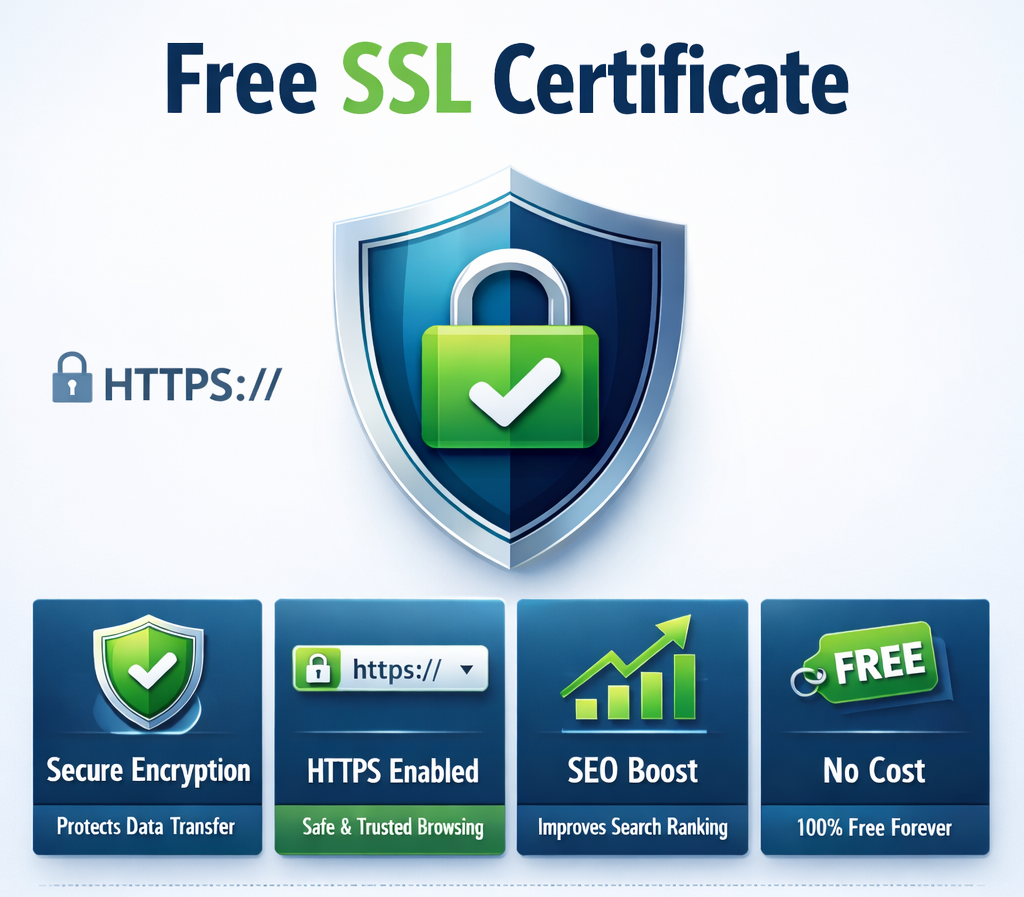
How Free SSL Certificate Works
A free SSL certificate secures your website by encrypting data exchanged between visitors and your server. The process happens automatically in the background and follows a standard SSL/TLS handshake workflow.
Domain Validation
The certificate authority verifies that you control the domain before issuing the SSL certificate.
Certificate Issuance
Once validated, the free SSL certificate is issued and installed on the server.
Encrypted Connection
An encrypted HTTPS connection is established using SSL/TLS encryption keys.
Secure Data Transfer
All data sent between browser and server is encrypted and protected.
Browser Trust
Browsers recognize the certificate as trusted and display the padlock icon.
List of Popular Free SSL Certificate Providers
Let’s Encrypt
Let’s Encrypt is the most popular free SSL certificate authority, trusted by all major browsers and backed by industry leaders. It enables websites to secure traffic using HTTPS without any cost.
Key Features
- Free Domain Validation (DV) SSL certificates
- Trusted by all modern browsers
- Automatic issuance and renewal
- Ideal for blogs, small sites & large-scale deployments
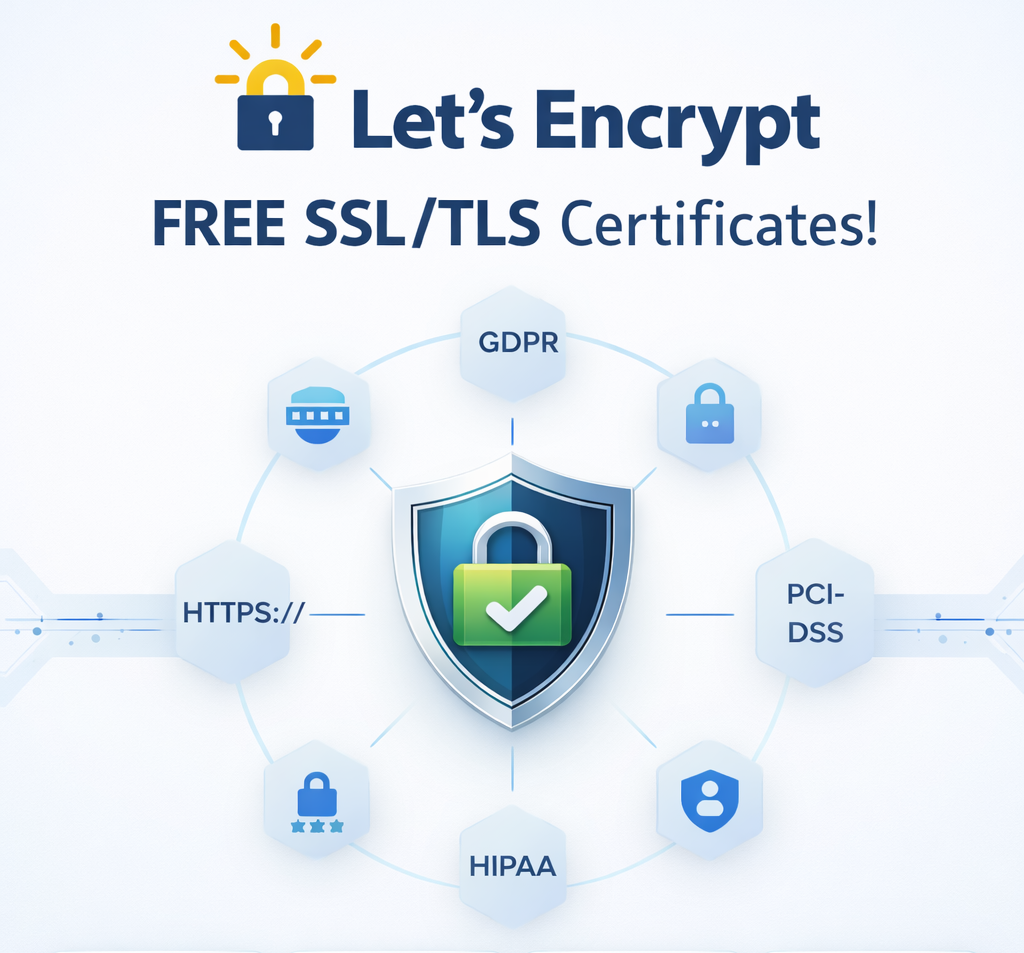
ZeroSSL
ZeroSSL is a free SSL certificate provider that offers easy certificate issuance through both automated and manual validation methods. It is widely used by developers and small businesses looking for quick HTTPS deployment without complex setup.
Key Features
- Free Domain Validation (DV) SSL certificates
- Browser-trusted HTTPS encryption
- ACME support for automated renewal
- Manual certificate issuance via dashboard
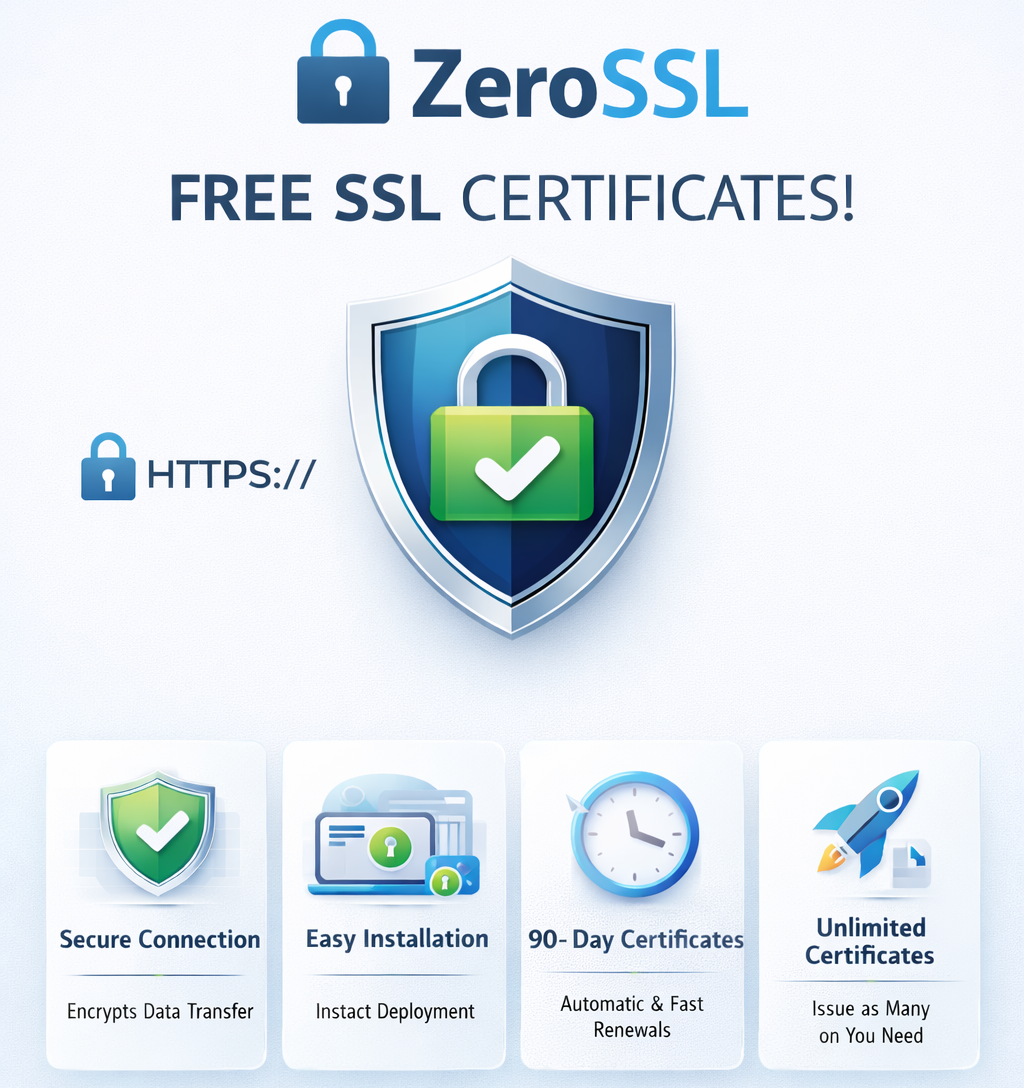
Cloudflare SSL
Cloudflare SSL provides free HTTPS encryption as part of its global CDN and security platform. It helps websites secure traffic instantly while also improving performance, reliability, and protection against attacks.
Key Features
- Free SSL included with Cloudflare CDN
- Automatic HTTPS and certificate management
- Flexible SSL modes (Flexible, Full, Full Strict)
- Ideal for performance, DDoS protection & security
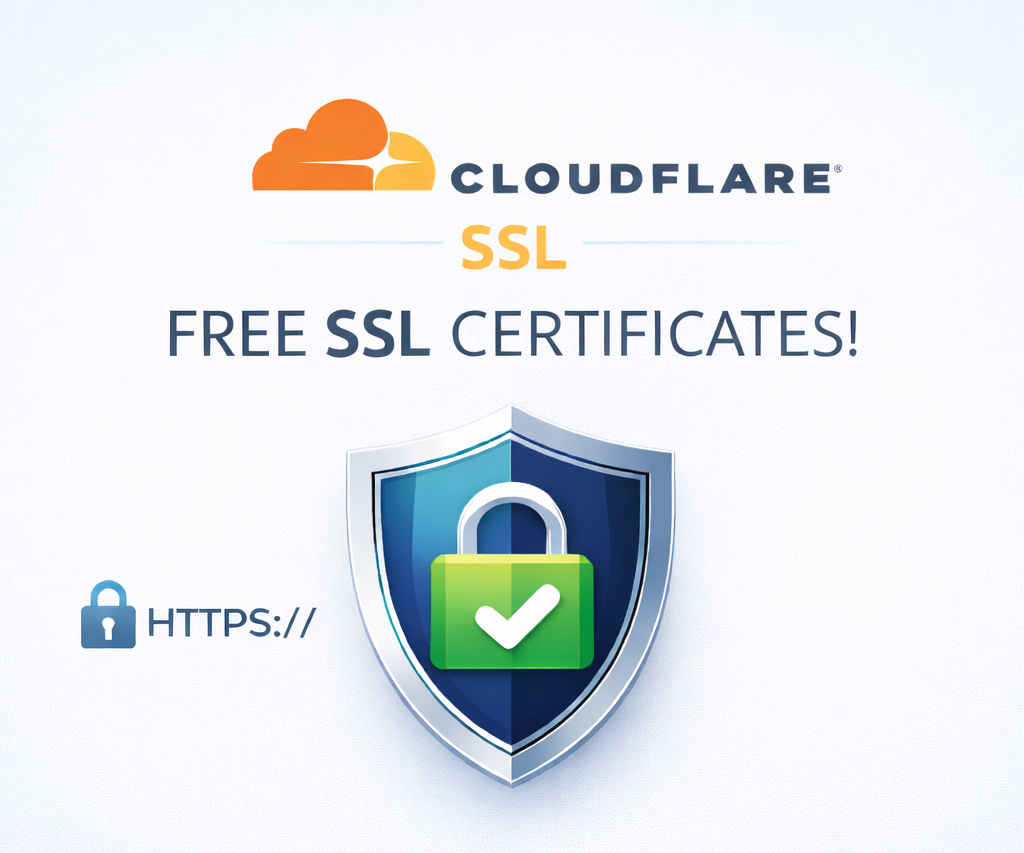
SSL.com Free Trial
SSL.com offers a free trial SSL certificate that allows users to test paid-grade SSL security before making a purchase. It is ideal for businesses that want higher trust validation without immediate cost.
Key Features
- Free trial for paid SSL certificates
- Supports DV, OV, and EV certificate testing
- Trusted by all major browsers
- Best for evaluation and short-term use
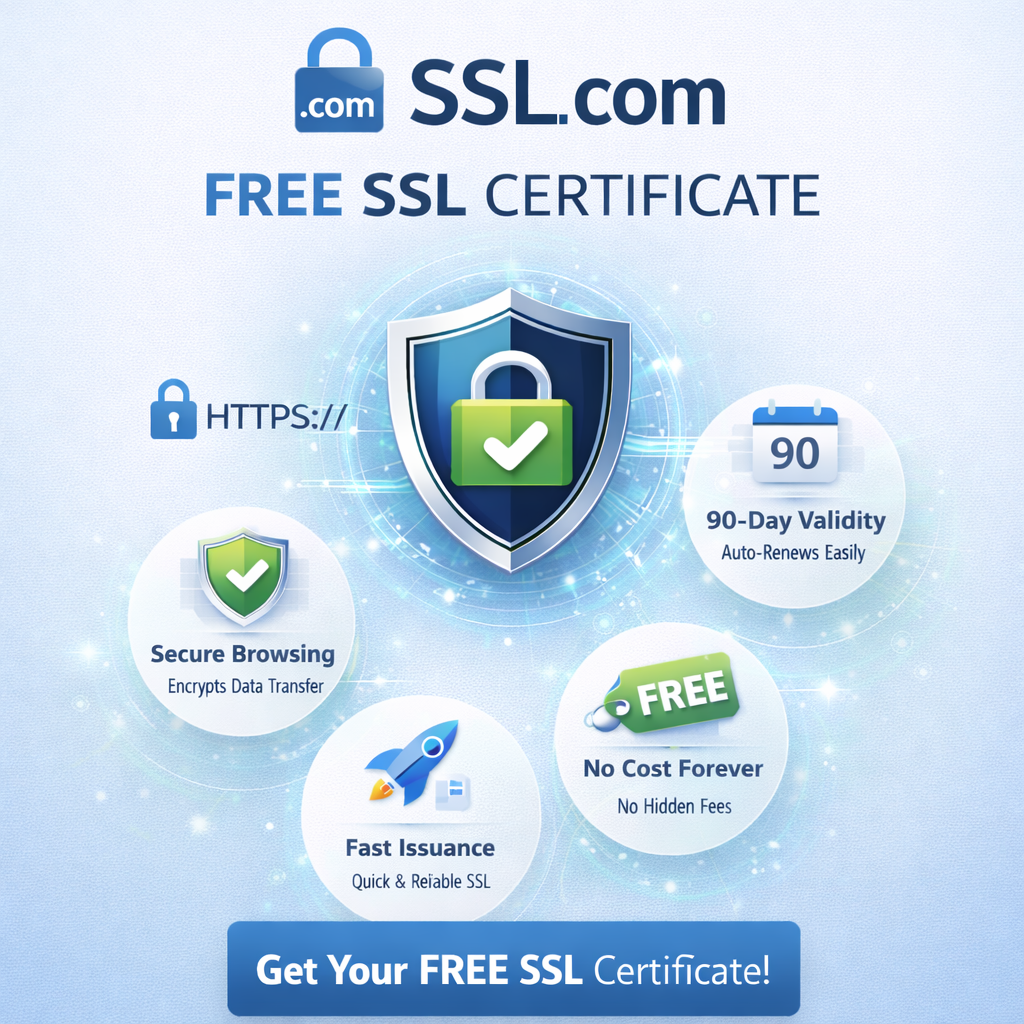
FreeSSL.org
FreeSSL.org is a web-based platform that allows users to generate free SSL certificates without installing command-line tools. It uses trusted certificate authorities to issue Domain Validation (DV) SSL certificates suitable for basic HTTPS encryption.
Key Features
- Free Domain Validation (DV) SSL certificates
- No command-line knowledge required
- Browser-trusted HTTPS encryption
- Best for beginners and small websites
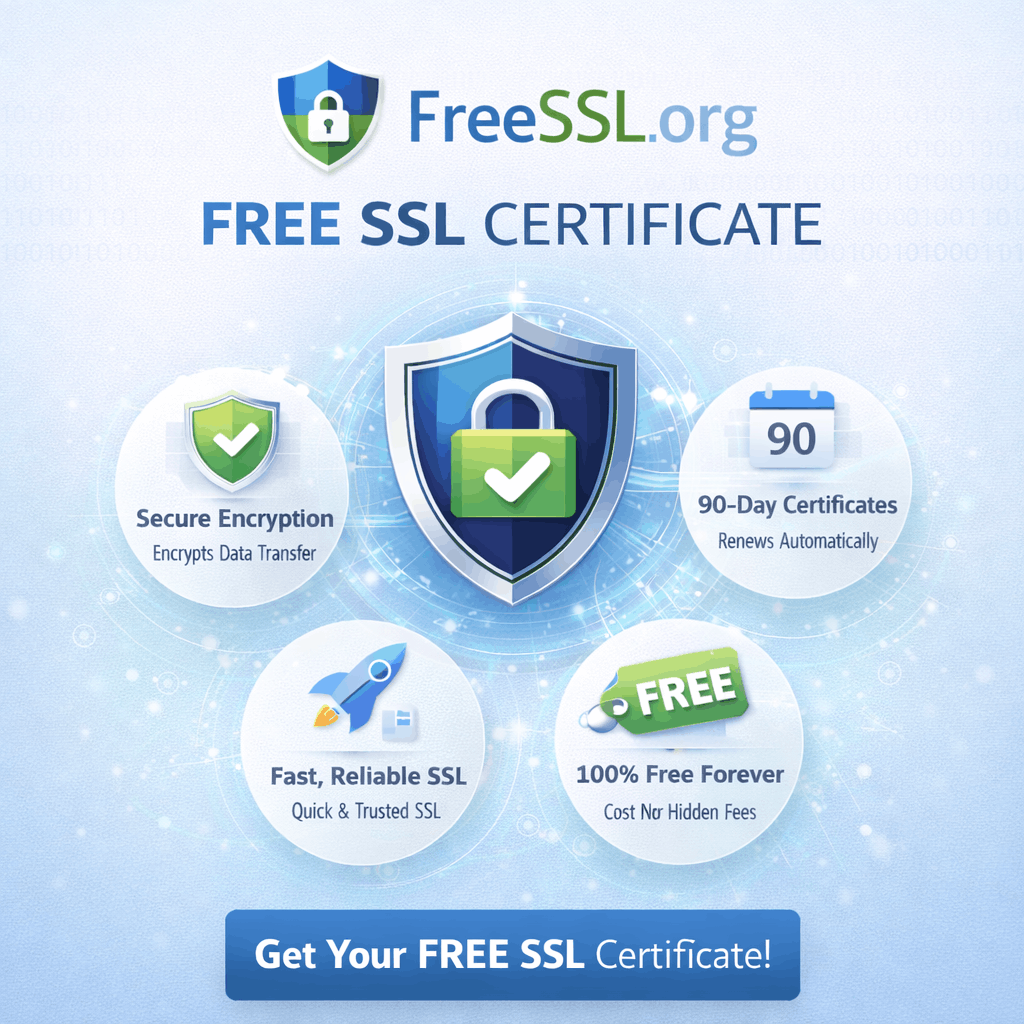
SSLForFree
SSLForFree is a popular web-based platform that allows users to generate free SSL certificates powered by Let’s Encrypt. It provides an easy interface for manual SSL issuance without requiring server-side tools.
Key Features
- Free Domain Validation (DV) SSL certificates
- Powered by Let’s Encrypt
- Manual certificate generation via web interface
- Suitable for beginners and shared hosting users
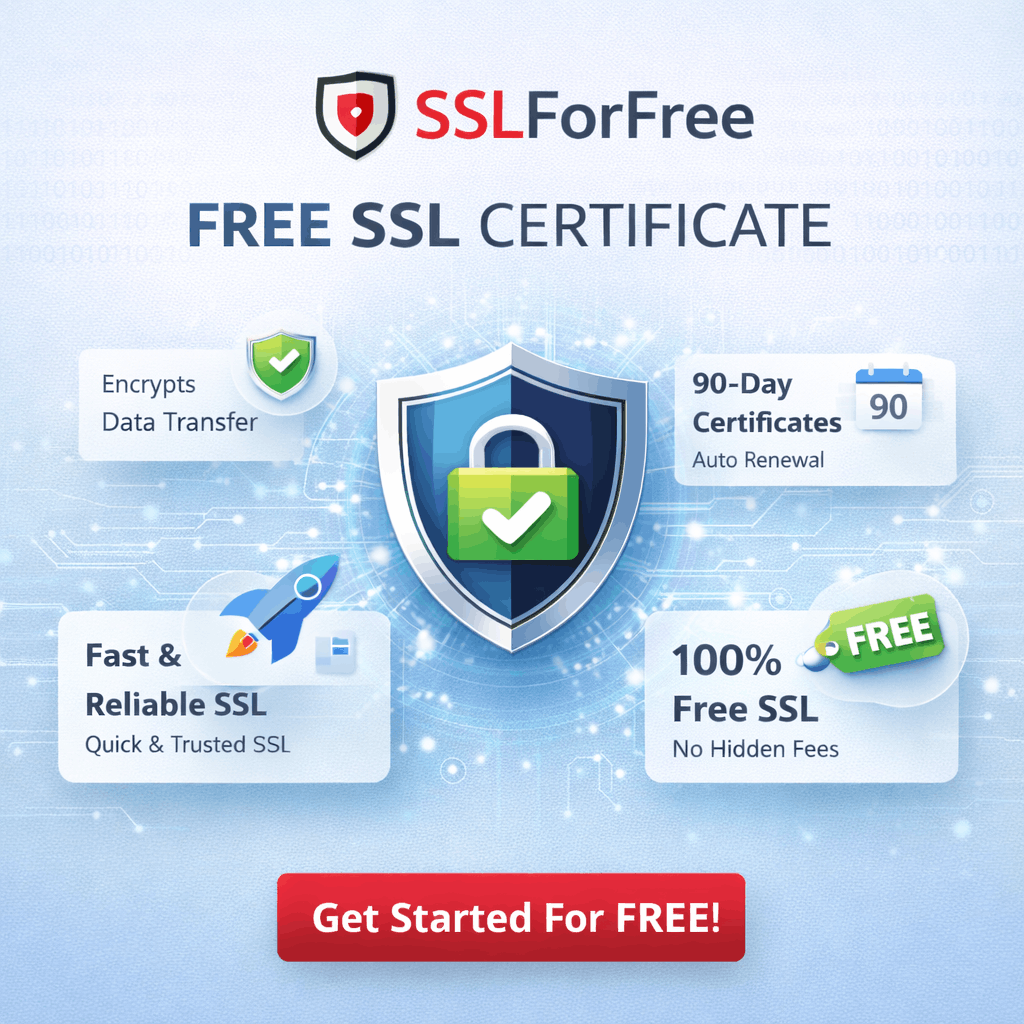
Free SSL vs Paid SSL Certificates
Free SSL
- ✔ Displays browser padlock
- ✔ Provides HTTPS encryption
- ✔ Removes “Not Secure” warning
- ✖ No warranty protection
- ✖ Limited or no support
- ✖ No business identity assurance
Paid SSL
- ✔ Displays browser padlock
- ✔ Strong HTTPS encryption
- ✔ Prevents security warnings
- ✔ Warranty & financial protection
- ✔ Dedicated technical support
- ✔ Builds user & business trust
Limitations of Free SSL Certificates
Free SSL
Certificates
Only domain ownership is verified, not business identity.
No financial protection if encryption is compromised.
Certificates require frequent renewal, usually every 90 days.
No dedicated technical or customer support.
Not ideal for eCommerce, payments, or business websites.
When Should You Avoid Free SSL?
eCommerce & Payments
Free SSL certificates are not recommended for online stores or payment processing websites where customer trust, warranties, and compliance are critical.
Business & Corporate Websites
If your website represents a registered business, paid SSL certificates provide organization validation, higher trust, and brand credibility.
Sensitive User Data
Websites collecting login credentials, personal data, or confidential information should avoid free SSL due to lack of warranty and support.
Best Alternative to Free SSL Certificates
Upgrade from free SSL to paid certificates for higher trust, warranty, and support.
Sectigo SSL
Popular choice for small to mid-sized businesses.
- ✔ Organization & EV options
- ✔ Trusted brand worldwide
- ✔ Warranty included
- ✔ Business-ready SSL
SSL.com
Best value paid SSL and ideal upgrade from free SSL.
- ✔ Domain & Organization Validation
- ✔ Warranty protection
- ✔ Trusted by all major browsers
- ✔ Ideal for blogs, business & eCommerce
DigiCert SSL
Enterprise-grade SSL with maximum trust.
- ✔ Highest validation levels
- ✔ Premium warranty coverage
- ✔ Compliance-ready
- ✔ Large enterprises & finance
Frequently Asked Questions
What is a free SSL certificate?
A free SSL certificate encrypts data between a website and its visitors at no cost. It helps secure information and enables HTTPS on your site.
Are free SSL certificates safe to use?
Yes. Free SSL certificates issued by trusted authorities use strong encryption and are safe for securing websites.
Who should use a free SSL certificate?
Free SSL certificates are ideal for blogs, personal websites, small business sites, portfolios, and testing environments.
What are the limitations of free SSL certificates?
Free SSL certificates usually offer only domain validation, shorter validity periods, and no warranty or dedicated support.
Do free SSL certificates support HTTPS?
Yes. Free SSL certificates fully support HTTPS and are trusted by all major web browsers.
How long is a free SSL certificate valid?
Most free SSL certificates are valid for 90 days and must be renewed regularly, often through automated renewal systems.
Can I use a free SSL certificate for an ecommerce website?
While possible, ecommerce websites are better suited for paid SSL certificates that offer higher trust and business validation.
Is encryption strength lower in free SSL certificates?
No. Free and paid SSL certificates use the same encryption standards, such as 256-bit encryption.
What happens if my free SSL certificate expires?
An expired SSL certificate can cause browser security warnings and may negatively affect visitor trust and SEO.
Can I upgrade from a free SSL certificate later?
Yes. You can upgrade to a paid SSL certificate at any time for enhanced trust, validation, and additional features.

